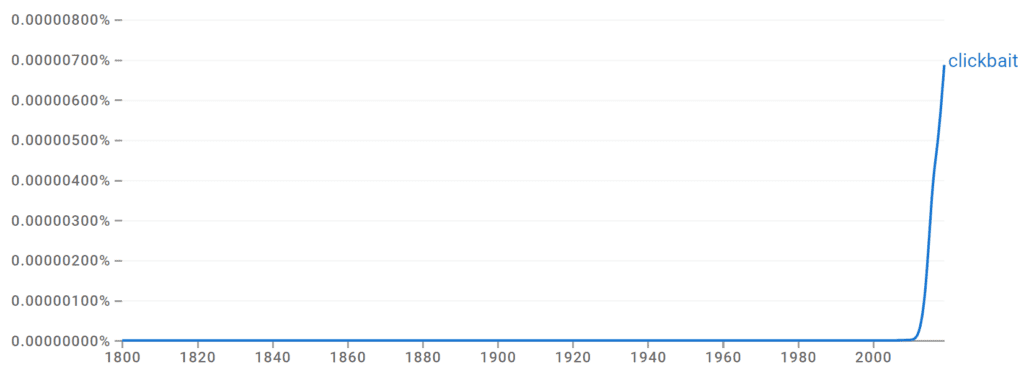The internet has become a medium for producing new words and including them in the dictionary. One good example is the term clickbait. Let’s examine the definition and origin of the noun clickbait. I also provided examples of how to use this word in a sentence.
What Does Clickbait Mean?

Clickbait is a closed compound word for click and bait, which is a noun that refers to a sensationalized title or headline that lures one to click the link. You can spot these deceiving titles in videos, articles, social media posts, and photos.
For example, a YouTube video title might give you the impression that a famous celebrity has died because it says he has “left us.” But when you click on the video, the narrator explains that he merely retired from acting or is going on a break.
Clickbait Origin

The term clickbait is a new addition to the Oxford English Dictionary in the fall of 2016. It was coined in December 2006 by Jay Geiger in a blog post.
The noun combines the words click, which means the click of the computer mouse, and bait, which refers to food used to entice fish or other animals. Symbolically, clickbaits treat internet users as prey lured into clicking nonsensical content.
Clickbait used to be an open compound word, click bait. But because of language’s evolution, people grew more comfortable using it as one word.
Some people informally use clickbait as a verb. Their conjugations include clickbaited, will clickbait, clickbaits, is clickbaiting, etc.
Clickbait is also synonymous with the less frequently used term, link bait.
Is Clickbait an Issue?
Clickbaits are considered a modern technological issue because they show that content creators care more about views than quality. Most websites use traffic numbers to quantify their success and bill advertisers.
Whether the viewer enjoyed the content or not, they still clicked on it and contributed to their revenue.
Producing clickbait content is unethical because producers focus on creating profit instead of giving value to viewers. In essence, it deceives millions of people as they appeal to people’s innate curiosity and emotions.
Clickbait headlines may lead to disinformation and fake news using shocking headline titles that lead people to a misleading report. And even if the content is not technically false, it still deliberately fools readers because they don’t present objective facts. The algorithm will even suggest similar videos to retain your attention.
How to Use Clickbait in a Sentence
Here are some examples of clickbait in a sentence.
- I can’t stand being on social media lately because everything is such clickbait internet content.
- The internet is flooded with fake news stories, clickbait content, and internet scams. It’s time for a change. I want to see engaging headlines that aren’t misleading.
- I don’t want to write clickbait articles anymore. I want to put my journalism degree to good use and write quality content for the internet.
- I’m so glad the recent algorithm update penalizes clickbait-type content.
- Don’t fall for clickbait titles! The article is never what the heading promises.
- Within New Zealand, the ubiquitous clickbait ads – or “chum ads” to their detractors – are mostly operated by the global ad giants Taboola and Outbrain, the two dominant players worldwide. (The Spinoff)
Clickbait Summary
If you spend considerable time on the internet, you’ve likely come across the word clickbait. This closed compound word is a noun with a negative connotation that means a sensationalized title or headline that lures one to click the link. Do you know how to spot clickbait? What other internet slang words do you want to learn?
